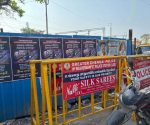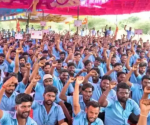Chinnamanna Narayanaswamy Naidu: The farmer who lived without electricity and helped power TN farms | Chennai News – The Times of India

There was a reason why Chinnamanna Narayanaswamy Naidu — whose birth centenary is being celebrated by farmers across Tamil Nadu today — lived the last six years of his life, from 1978 to 1984, without electricity, relying solely on kerosene lamps. For this farmer from Coimbatore, electricity was more than a mere utility; it was a fight for justice.
Naidu, hailed as Uzhavar Perunthalaivar or ‘great leader of farmers’, dedicated his life to fighting for farmers’ access to electricity. His protest against tariffs was so resolute that he refused to pay for power, choosing to live without it, says daughter-in-law N Radha. “When he had a heart attack at home, the doctor wanted to check his ECG with a machine. He refused as it needed electricity from a neighbour’s house.”
Born on February 6, 1925, at Sengalipalayam in Coimbatore, Naidu led his first major farmers’ victory in 1957, when he helped restore 16-hour electricity supply to farms after it was cut to four hours for the benefit of industries. In 1966, he brought together farmers in north Coimbatore, forming a movement that became a district body in 1967 and a state-wide force by 1973.
“Until the early 1960s, there was no major farmers’ organisation in TN,” says historian C R Elangovan. Electricity access for farmers too was limited. “In 1963, paying farmers were allowed just one lamp on their land. After several demands, it was increased to three lamps totalling 150 watts. But they still had to pay per unit until 1990,” says Elangovan.
In 1970, the govt hiked the power tariff from 8p per unit to 10p per unit, leading to widespread protests. Farmers refused to pay for electricity until the tariff was reduced. Attempts to disconnect power were met with resistance in Coimbatore, and 3,000 farmers were arrested. Though the tariff was briefly reduced to 9p per unit, it was hiked again to 12p in 1972, which led to the historic ‘Katta Vandi Porattam’ (bullock cart protest), where farmers took to the streets in large numbers, many facing jail terms.
“The rally was intended as a peaceful demonstration, with no plans to block roads,” says V R Balasundaram, a friend of Naidu. “However, fearing the scale of the protest, police arrested Naidu. Despite this, other farmer leaders proceeded. Thousands of bullock carts blocked major roads, railway stations, bus stands and the collector’s office in Coimbatore, bringing the city to a standstill.”
Chief minister M Karunanidhi instructed then-MLA K N Kumarasamy to invite farmer leaders to Chennai for talks. The protests intensified and Naidu was released from jail and addressed farmers in front of the Coimbatore collector’s office. “The crowd dispersed only after he assured them he was hopeful of a positive outcome,” says Balasundaram. Despite discussions, their demands remained unmet. Protests restarted and 27,000 farmers were arrested and 15 killed in police firing. After negotiations, the govt revised power rates. A tariff hike to 16p per unit, higher meter rents, and pump set charges led to fresh protests in 1977-1978 with roadblocks and bridge demolitions. “I remember signboards at village entrances warning officials not to enter without permission from the farmers’ association president,” says G Ranganathan, of the state executive committee of the Tamizhaga Vivasayigal Sangam.
A partial settlement was reached in 1978, reducing tariffs, meter rents, and fixed charges and abolishing cess on cash crops. Unhappy, Naidu launched fresh agitations in 1979. The protests continued, and on December 22, 1980, he was detained under the National Security Ordinance.
Naidu’s commitment to the cause came at great personal cost. In 1969, while he was in Chennai advocating for farmers’ rights, his wife died in Coimbatore. “When we informed him, he said he would come after his meeting,” says his daughter V Lalithamani. The family endured financial hardships as he spent much of his life in jail and travelled across India to support farmers’ protests. Although he saved 40 sovereigns of gold for his daughters’ weddings, he pledged it to fund the farmers’ movement. “He used his farming income, which was meagre, to sustain the association and was in debt when he died,” says Lalithamani.
Naidu also made an impact on TN’s political scene. In the 1980 parliamentary elections, the AIADMK suffered losses due to his campaign against them. Recognising the growing influence of farmers, political parties sought his support. Former chief minister M G Ramachandran visited Naidu twice at his home to seek his support for the 1980 assembly elections. Karunanidhi also met him and sent representatives. Congress leader K T Kosalram once informed him that Prime Minister Indira Gandhi wished to meet him in Madurai. Naidu declined, saying, “She is the Prime Minister; your visit is enough.”
Against medical advice, Naidu addressed a public gathering in Tuticorin district, where he had a heart attack. He died on December 21, 1984.
In 1989, electricity bills for farmers were waived. Since then, farmers in TN have received free electricity for irrigation, a benefit largely attributed to the efforts of Naidu.
Email your feedback with name and address to southpole.toi@timesofindia.com
















